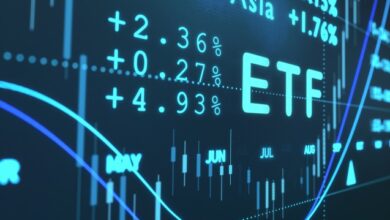Jamie Dimon Says Crypto Is a “Decentralized Ponzi Scheme.” He Has a Point.

[ad_1]
JPMorgan Chase CEO Jamie Dimon thinks the multitrillion-dollar cryptocurrency market is a “decentralized Ponzi scheme.” That’s what he said — under oath! — at a Sept. 21, 2022, Congressional hearing.
Does he have a point?
I think he does, yes. But his comments were more nuanced than the headlines would suggest. Let’s break down what Dimon actually said about crypto and why it matters for you.
What Jamie Dimon Said
Testifying before the House Oversight Committee, JPMorgan Chase CEO Jamie Dimon said, “I am a major skeptic on crypto tokens — which you call cryptocurrencies — like Bitcoin. They are decentralized Ponzi schemes, and the notion that’s good for anybody is unbelievable.”

You own shares of Apple, Amazon, Tesla. Why not Banksy or Andy Warhol? Their works’ value doesn’t rise and fall with the stock market. And they’re a lot cooler than Jeff Bezos.
Get Priority Access
Watch the clip and you’ll see he can barely bring himself to utter the word “cryptocurrencies.”
Dimon’s comments came with a big caveat though. He distinguished between cryptocurrencies and other blockchain-based tokens.
Right before his Bitcoin comment, he said, “You have to separate blockchain, which is real; DeFi, which is real; ledgers; tokens that do something…smart contracts. … I’m not a skeptic [of those].”
So Dimon thinks crypto coins that claim to have intrinsic value are scams, but he’s bullish on the blockchain.
Dimon has been skeptical of cryptocurrency for years. In 2017, he told CNBC that Bitcoin is a fraud “worse than tulip bulbs,” a reference to the Dutch tulip mania that created a bubble in the 17th century. He vowed to fire any JPMorgan trader caught trading crypto because “it’s against our rules and they are stupid.”
So his “decentralized Ponzi scheme” comment came as no surprise. But he did make three important points elsewhere in his testimony.
Bitcoin vs. DeFi Tokens: Flipping the Script
Maybe the most notable nugget to come out of Dimon’s testimony was his apparent support of decentralized, blockchain-based tokens.
Unlike crypto tokens that act like traditional currencies — Bitcoin (BTC), Ethereum (ETH), and the many altcoins — these tokens actually “do something,” said Dimon. They support smart contracts, person-to-person payments, metaverse transactions, and other economic functions.
This is interesting because most crypto commentators have it the other way. They think established cryptocurrencies like BTC and ETH are here to stay and will become more important to the global economy in the coming years. They’re skeptical of decentralized finance and smart contracts because they’re not yet widely used and appear not to solve real-world problems any better than existing solutions — like, say, legally binding contracts.
In summary, in Dimon’s view:
| Fraud | Not Fraud |
| Cryptocurrencies like BTC | BlockchainLedgersDeFiSmart contracts“Tokens that do something” |
Bitcoin Isn’t a Special Case
Nearly as notable is Dimon’s implication that there’s no difference between Bitcoin and other cryptocurrencies.
This isn’t a popular opinion. Most crypto experts, even those on the skeptical side of the spectrum, think Bitcoin, Ethereum, and so-called stablecoins like Tether (USDT) are real assets that aren’t going anywhere. They might not be investment-grade in the sense that U.S. Treasury bills are investment-grade, but they’re not outright scams.
Dimon disagrees. He wants nothing to do with any crypto token that calls itself a currency — with one key exception.
Stablecoins Have Potential
Dimon sounded less skeptical about stablecoins, which peg their value to real-world assets like the U.S. dollar. He likened them to money market funds and sounded supportive of federal regulation to make them safer for everyday users.
In fact, JPMorgan has a proprietary token that functions a lot like a stablecoin. Known as JPM Coin, the bank uses it within a closed system to support corporate treasury services, cross-border payments, and financial transfers between banks.
My Take
What do Jamie Dimon’s crypto-skeptic comments mean for the average investor?
I think he’s more right than wrong, but I’m cautious about his apparent enthusiasm for stablecoins.
He’s Mostly Correct About Crypto Coins …
Recent events have demolished crypto boosters’ go-to arguments:
- “It’s a store of value!” No. BTC was down nearly 60% in 2022 as of Sept. 26. ETH was down over 64%. The S&P 500 index? Down about 24% for the year. (Still brutal.)
BTC Since Jan. 1, 2022
ETH Since Jan. 1, 2022
S&P 500 Since Jan. 1, 2022
- “It’s a hedge against inflation!” No. See above.
- “It’s untraceable!” Ilya Lichtenstein and Heather Morgan, who allegedly masterminded a scheme to launder some $4.5 billion in crypto, would beg to differ. So would former TerraUSD boss and current international fugitive Do Kwon, whose alleged shenanigans helped spark the crypto crash of early 2022.
- “It’s super secure!” Nah. If you want security, keep your money under the mattress.
… But the CEO of a Megabank Is Probably Biased
Again, the real news out of Dimon’s testimony was his praise for smart contracts, DeFi, and “tokens that do something.” That, and his apparent embrace of well-regulated stablecoins.
Maybe Dimon is just calling it like he sees it. Or maybe he sees something in it for himself and his employer. (Which, let’s be real, are one and the same — Dimon is the undisputed face of JPMorgan Chase and probably the best-known big-bank CEO.)
Dimon’s aside that Chase already has a quasi-stablecoin for internal use wasn’t news to people who follow the bank, but it shows that they’ve put serious resources behind a blockchain-based product.
In fact, Chase’s Onyx subsidiary is hard at work on an entire blockchain-based payments architecture. Onyx calls itself “the first global bank to offer a blockchain-based platform for wholesale payments transactions.” Although it still mostly operates behind the scenes, a more predictable regulatory framework for blockchain products could give it the green light to enter the consumer market.
And make a boatload in the process.
Bottom Line: Don’t Jump on DeFi Just Yet
Risk-averse retail investors — including yours truly — have long been skeptical of blockchain-based products in part because the space is a financial Wild West where everyone is anonymous (or thinks they are) and fraud is rampant.
So it’s legitimately encouraging that JPMorgan Chase and other big banks are embracing the blockchain and advocating for sensible regulation of decentralized finance.
But there’s still a long way to go. Jamie Dimon said his piece at the sort of Congressional hearing that precedes a bunch of other Congressional hearings that may or may not produce actual draft legislation. Which may or may not come to a vote, let alone become law.
Until then, crypto and the blockchain remain wild. Which means you should tread carefully. No, don’t put your life savings into a high-risk Bitcoin short, but don’t put a cent more than you can afford to lose into crypto either.
Source link





